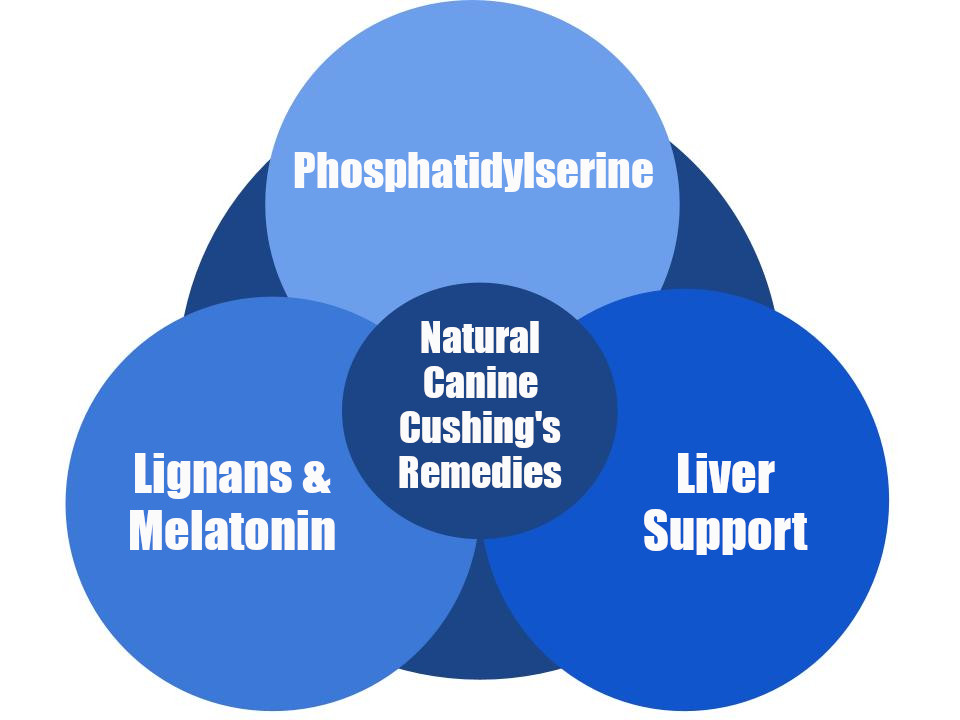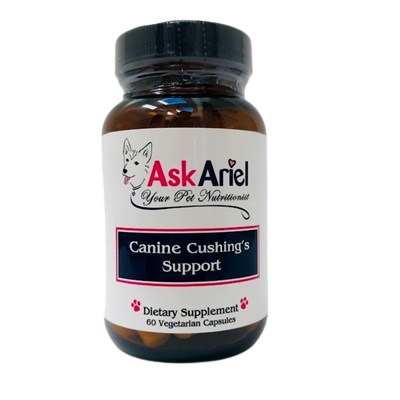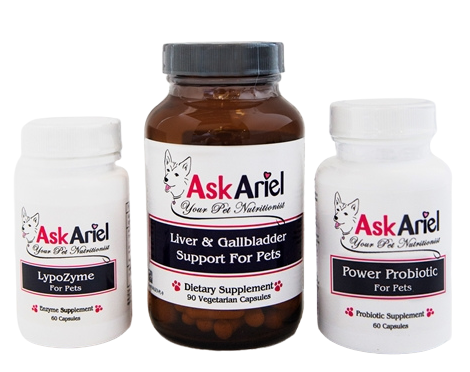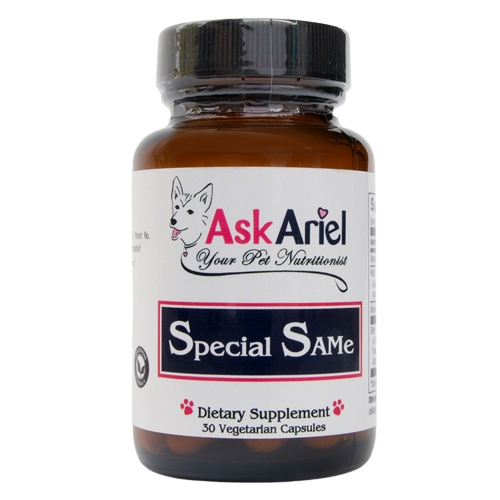Natural Remedies For Cushing's Disease In Dogs
Canine Cushing's Supplements
How To Treat Cushing's Disease In Dogs Naturally
Cushing's disease in dogs is a complex endocrine disorder that causes elevated cortisol and/or sex hormone levels. Symptoms may include increased water drinking, frequent urination, panting, a potbelly, thinning skin and hair loss. Many pet owners want to know how to lower cortisol in dogs naturally. Our clients report the best results when phosphatidylserine, liver support supplements, lignans and melatonin are used together to help balance cortisol levels.

 Phosphatidylserine - Canine Cushing's Support is a phosphatidylserine supplement that naturally helps the body reduce cortisol levels, and it can improve your dog's quality of life and symptoms of canine Cushing's disease. It is the excess cortisol that is causing the symptoms such as panting and excess water consumption, so by reducing cortisol levels, your dog's symptoms can improve. The key ingredient, phosphatidylserine, has been scientifically shown to reduce cortisol levels and is also an important nutrient for brain function. Can be used for dogs that have been diagnosed with "possible Cushing's." Phosphatidylserine - Canine Cushing's Support is a phosphatidylserine supplement that naturally helps the body reduce cortisol levels, and it can improve your dog's quality of life and symptoms of canine Cushing's disease. It is the excess cortisol that is causing the symptoms such as panting and excess water consumption, so by reducing cortisol levels, your dog's symptoms can improve. The key ingredient, phosphatidylserine, has been scientifically shown to reduce cortisol levels and is also an important nutrient for brain function. Can be used for dogs that have been diagnosed with "possible Cushing's."
Liver Support - Many dogs with Cushing's will develop elevated liver enzymes or liver disease due to chronically increased cortisol levels. The most common elevated laboratory value in dogs with Cushing's is Alkaline Phosphatase (ALK Phos). Using natural liver support supplements, such as Ask Ariel's K9 Liver Support Kit and Special SAMe, can help to reduce stress on the liver and lower elevated liver enzymes.
 K9 Liver Support Kit - Our trio of liver supplements have been quite effective in helping pets with elevated liver enzymes. The liver is the main "clearinghouse" for excess hormones. When used in combination with LypoZyme and Power Probiotic, Liver Support helps to flush out toxic overload. The excess cortisol is putting a lot of stress on your dog's body overall, so it is important to use these natural sweepers together to try to clean out the excess cortisol and reduce the workload on the liver and digestive tract. K9 Liver Support Kit - Our trio of liver supplements have been quite effective in helping pets with elevated liver enzymes. The liver is the main "clearinghouse" for excess hormones. When used in combination with LypoZyme and Power Probiotic, Liver Support helps to flush out toxic overload. The excess cortisol is putting a lot of stress on your dog's body overall, so it is important to use these natural sweepers together to try to clean out the excess cortisol and reduce the workload on the liver and digestive tract.

Special SAMe - SAdenosylmethionine (SAMe) is scientifically proven and widely prescribed by veterinarians for liver support and detoxification. It supplements metabolic activity, helping maintain glutathione levels (which is known to be protective and detoxifying for the liver). Promotes healthy liver function and cell regeneration.
Lignans & Melatonin - Melatonin and lignans inhibit enzymes that are used in cortisol production. Research studies conducted at the University of Tennessee - Knoxville (UTK) concluded that melatonin can help reduce excessive cortisol levels. Lignans have also been studied for their role in blocking enzymes needed for cortisol production. UTK has found that the combination of lignans and melatonin works synergistically to reduce cortisol levels in dogs.
Some Cushing's medications can cause adverse side effects in dogs including vomiting, lethargy, diarrhea and even hypoadrenocortical crisis. While some medications may be necessary depending on the severity of your dog's Cushing's symptoms, often canine Cushing's medications can be delayed or avoided. It is important for pet owners to research the potential side effects of Cushing's disease medication for their dog. Many dogs don't HAVE TO BE on medication, especially not initially if the symptoms are mild. While every dog is different, natural treatment for Cushing's disease in dogs can be started and then medication added later if needed.
Max
"Max has been using the Canine Cushing's Support formula for 4 months with good results. Max's appetite has gone from voracious, always hungry to pretty normal. His thirst was almost unquenchable, drank so much water! We are so happy we found a remedy to help him with his Cushing's Disease." - D. Franke, Wisconsin
Cushing's Disease in Dogs: Symptoms
Concerned pet owners might first notice that there are skin sores that keep recurring or that their dog's drinking and urination patterns have changed. Sometimes canine Cushing's disease symptoms in dogs are much more subtle, and in the early stages, pets may only display a few (if any) of the symptoms below.
- Bloated, pot-bellied abdomen
- Hair loss (usually symmetric)
- Thinning of the skin and fur
- Susceptibility to infections and diabetes
- Weakening of skeletal muscles, exercise intolerance
Other common clinical signs are dilute urine, protein loss in the urine and high blood pressure. Some pet owners report that their cushing disease dog is licking because they are looking for food or they may have an upset stomach. Natural remedies for Cushing's disease in dogs can improve the symptoms of Cushing's disease and your dog's overall well-being without the side effects of Cushing's disease medications.
Bella
"I'm a doctor (for humans) and because I'm well aware of all of the side effects that accompany medications, I always choose to go the all-natural route first for all of my fur-babies. I've been using Ask Ariel products for several years now and have been more than pleased with the results. This is my 18 year young beagle, Bella. Bella has K9 Cushing's and she's been on Ask Ariel's Canine Cushing's Support for a few years now. We've been able to keep her healthy, happy and still active. She walks/runs 1/2 mile every day and looks forward to her car rides. I have 2 dogs and 5 cats and I rely on Ask Ariel products to keep them healthy. Great Job Ask Ariel. BTW...I continue to learn so much from your newsletters." - Dr. Valerie Monteiro
What Is Cushing's Disease in Dogs?
As dogs get older, some may start developing signs of Canine Cushing's disease. While these slow and gradual changes that may seem like they are related to aging, could be symptoms of Canine Cushing's disease (also known as Cushing’s syndrome in dogs). The American Kennel Club* reports that Cushing's disease is more prevalent in Poodles, Dachshunds, Boston terriers, Boxers, and Beagles, but it can occur in any breed. Many dogs with canine Cushing's have a history of allergies and many have taken steroids.
*Reference: Dr. Jeff Grognet. Cushing's Disease in Dogs. The American Kennel Club, Inc. October 5, 2016.
Canine Cushing's disease is an endocrine disorder. The endocrine system is responsible for producing and secreting hormones, which are the body's chemical messengers. Cortisol is the "fight-or-flight" steroid hormone that regulates many processes, including metabolism, helping the body respond to stress and modulating the immune system. Cushing's disease (hyperadrenocorticism) results when the body produces too much cortisol. It can weaken the immune system and cause pain and discomfort.
The three primary causes of Cushing's disease in dogs include a small pituitary tumor, an adrenal gland tumor or the long-term use of high-dose steroids. Almost 85% of Cushing's cases are pituitary-based, meaning that the pituitary is sending too many hormones to the adrenal glands, which causes them to overproduce cortisol. An adrenal tumor can trigger excess cortisol production in adrenal-dependent Cushing's disease.
Many laboratory tests for Cushing's disease can be inconclusive and/or show abnormal liver values. You should always ask for copies of your pet's blood work. If values are within or close to normal range, they may not seem concerning. Repeated and progressive elevations in certain enzymes, like alkaline phosphatase (ALP), may be a clinical sign of Cushing's disease. Quite often there is NO definitive diagnosis, just subtle signs. Many dogs are diagnosed with "probable Cushing's" or pre-Cushing's syndrome.
What Is The Prognosis For Dogs With Cushing's Disease?
The prognosis for dogs diagnosed with Cushing's disease varies based on factors such as the timeliness of detection, the underlying cause of the condition, and the individual response to treatment. Early diagnosis and intervention can significantly improve the prognosis, allowing for effective management of symptoms and potentially slowing disease progression. The specific form of Cushing's disease, whether pituitary-dependent or adrenal-dependent, may influence the treatment approach and, consequently, the prognosis. Integrating natural supplements for canine cushing's disease, dietary changes, and a holistic approach can help control symptoms and your dog's overall well-being. Supplements such as phosphatidyl serine, melatonin and lignans can have cortisol-regulating properties. Incorporating liver support supplements can assist the dog's body in managing the additional burden imposed by the excess hormones as dogs with Cushing's frequently have elevated liver enzymes. Additionally, a hypoallergenic diet with added fiber and omegas can contribute to overall health. Successful management of canine cushing's disease often involves a combination of medications, natural supplements, dietary adjustments and regular monitoring by your veterinarian.
What's The Difference Between Cushing's Disease & Atypical Cushing's?
Canine Cushing's disease can be hard to diagnose and many older pets can display symptoms. Dogs may be in different stages of the disease and may also have different hormones elevated. Some dogs may be definitively diagnosed as Cushing's, some may be probable Cushings (e.g. they have the symptoms but the tests aren’t conclusive) and some may have Atypical Cushings (where cortisol may be normal but steroid precursors (e.g. sex hormones) may be elevated.
Veterinary endocrinologists at the University of Tennessee in Knoxville (UTK) have a laboratory test that not only measures a dog’s cortisol levels but also tests a variety of steroid intermediate hormones (also called “sex steroids”) including androstenedione, estradiol, progesterone, 17-hydroxyprogesterone (also called 17-OH progesterone or 17-OHP) and aldosterone.

Diet Changes Can Help Dogs With Cushing's Disease
Many dogs with Cushing's Disease have a long history of allergies and/or steroid use. They also frequently have elevated liver enzymes, making it important not to overload the liver with excessive protein and fat. By feeding a low-fat, hypoallergenic novel protein diet and using home remedies for Cushing's Disease, many pet owners see a significant improvement in their dog's symptoms. When ordering supplements, please be sure to include the food you are feeding your pet along with health issues directly on the order form at checkout. We will include FREE diet suggestions on the packing slip that comes with your order.
Need Help? Please email us at [email protected]
We understand how challenging Cushing's disease can be for you and your pets. You may be wondering how to reduce cortisol in dogs naturally. We are here to help. If you need information about a particular pet health condition and the products that can help, please email us for assistance. We do ask for your understanding, however, as we cannot provide any consultative advice due to veterinary regulations that require a physical exam.
|
|
|
What are the symptoms of Cushing’s disease in dogs?
Early symptoms of Cushing’s disease in dogs are increased thirst and increased urination. The most distinguishing symptom of Cushing’s is a pot bellied appearance. Cushing’s generally affects middle aged and older dogs, so many owners will contribute some of the signs to normal aging. Cushingoid dogs may also have excessive panting, reduced activity, increased appetite, hair loss and recurrent skin infections.
How to help dogs naturally for Cushing syndrome?
Natural remedies can help to slow the progression of Cushing’s disease. It is a progressive endocrine disorder where the dog’s body produces too much cortisol, otherwise known as the fight or flight hormone. Phosphatidylserine has been scientifically shown to reduce cortisol levels. Canine Cushing’s Support is a natural supplement containing Phosphatidyl Serine to help reduce symptoms of Cushing’s, such as panting, excess water consumption, weakened immune response and a pot-bellied appearance. In the beginning stages of canine Cushing’s, many dogs respond very well to natural remedies and may not need to be on prescription medications.
Does Cushing’s disease in dogs affect the liver?
Laboratory testing for Cushing’s disease can show abnormal liver values for certain enzymes. Most dogs with Cushing’s will have increased ALP, alkaline phosphatase. Since the liver is responsible for filtering toxins out of the body, it is important to help reduce the workload on the liver. Prescription medications for Cushing’s disease in dogs can put further stress on the liver. Special SAMe helps to reduce elevated liver enzymes and supports liver health. S-adenosyl-L-methionine is backed by extensive scientific research and is widely recommended by veterinarians because it is safe and effective.
Why do dogs with Cushing’s smell?
Dogs with allergies or hormonal conditions, like Cushing’s, are more likely to exhibit skin odors and have oily skin. Oily skin can be a breeding ground for yeast and other bacteria, resulting in a stinky cheese smell. This yeast overgrowth can make your dog uncomfortable and cause excessive licking and scratching, blackened skin under the armpits or belly and doggie odor. With Cushing’s disease a dog’s skin and fur can thin out and they can are more susceptible to skin infections.
Why is my dog gaining weight and panting?
There can be many reasons that your dog is panting and gaining weight. As dogs age, they often put on a little extra weight due to a decreased activity level. The extra weight can make breathing more laborious which results in panting. Canine Cushing's disease is an endocrine disorder that can cause increased water drinking, frequent urination, a pot belly dog, thinning skin and hair loss. While some of the symptoms may seem like they are related to aging, these slow and gradual changes may also be a sign of Cushing’s syndrome in dogs.
What is Cushing syndrome in dogs?
Cushing syndrome or hyperadrenocorticism is an endocrine disorder characterized by the overproduction of cortisol, the stress hormone. Cushing’s disease is caused by 1. a tumor on the pituitary gland or 2. a tumor on the adrenal gland or 3. as a result of long-term steroid use. Dogs with Cushing syndrome develop a pot-bellied appearance, excessive thirst and increased hunger. They will require lifelong management of the condition to regulate the hormone levels and control secondary problems, like skin conditions and weight gain.
|
|
|